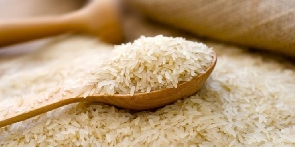Various stakeholders in the rice value chain have reiterated their commitment to end rice importation by 2023.
At a meeting organised by the John Agyekum Kufuor (JAK) Foundation, the stakeholders discussed ways to ensure local rice production becomes a sustainable venture.
The meeting brought together the Ghana Rice Inter-professional Body (GRIB), Ghana Commodity Exchange and the Ghana Standards Authority to discuss strategies on how to achieve the set target to guard against the importation practice.
Also in attendance were private sector groups who are going to work with Ghanaian farmers by providing them with harvesters and other logistical services.
Speaking on the sidelines after the opening session, President of GRIB, Nana Ayeh Adjei II disclosed that due to Covid-19, local rice farmers did not get the rice seeds on time, which might affect the volume of rice production this year.
However, he stated that the pandemic has not caused any major impact in the value chain, apart from the slow pace in retail sales.
He also disclosed that GRIB is expecting a mechanisation provider company before the end of the year to mop up paddy rice into warehouses to ease the issue of late harvesting.
He reiterated that Ghana had all it takes to achieve its set target of stopping rice importation.
He said the commitment to stop rice importation by Ghana motivated the assembling of various stakeholders to the forum to deliberate on strategies to achieve this target.
"It is all about Ghana must not import rice, so we brought all stakeholders together to increase local rice consumption that has already improved over the past months," he stated.
He added that players in the private sector, being partners, are interacting among themselves to identify challenges affecting the sector from the rice farmer to the miller, a development which is helping the private sector to remove challenges.
According to him, the stakeholders, at the end of the meeting, were going to figure out how they would support the advocacy, production, processing and marketing issues in the rice value chain.
He also hinted that they were going to proffer solutions to how the rice value chain can be developed in the various regions to enable Ghana attain the sustainability in rice production and also improve the quality of rice grown in Ghana.
Nana Adjei further stated that discussions about ways to ensure local rice production become a sustainable venture, as well as plans on how all farmers in the various regions will grow quality rice, get good market outlets and prices for the farmers, were going to take place.
Business News of Tuesday, 30 June 2020
Source: thefinderonline.com













